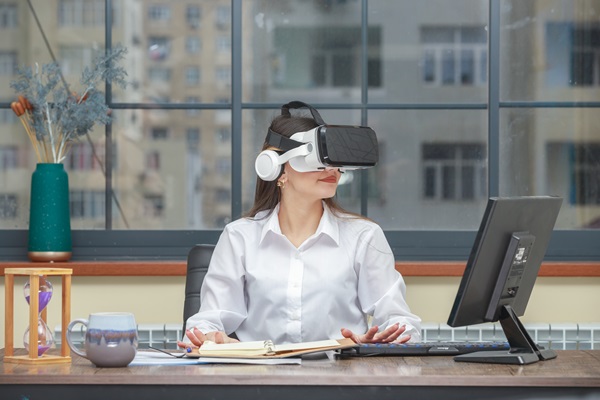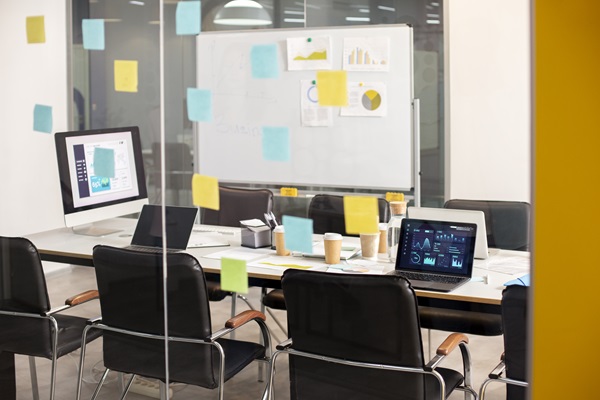In the dynamic landscape of modern business, the concept of workspaces is profoundly evolving. From traditional office settings to virtual environments and hybrid models, the future of workspaces is shaping how individuals and organizations collaborate, innovate, and thrive. This evolution is driven by technological advancements, changing cultural norms, and a growing emphasis on flexibility and efficiency. Exploring these trends illuminates the trajectory of work environments and underscores their pivotal role in shaping the future of work itself.

The Hybrid Work Model
Work has transcended the physical confines of the office, with remote work becoming not just a trend but a way of life. Employees and employers increasingly embrace hybrid work models that seamlessly blend office and remote work. The once rigid work structures have given way to flexibility.
Wellness-Centric Office Spaces
The well-being of employees is now a paramount concern in office design. Employers are incorporating biophilic elements, from indoor gardens to natural lighting, to enhance productivity and reduce stress. Ergonomic office furniture is no longer a luxury but a necessity for a healthy present and future of workspaces.
Sustainability and Green Initiatives
Sustainability is not just a buzzword; it’s a way of life for modern offices. Green initiatives are at the forefront, with eco-friendly design and sustainable materials reducing the carbon footprint. Offices are aiming for net-zero energy consumption and sustainable transportation options.
Technology Integration
The future of workspaces has become smarter, with the integration of IoT devices and automation. Smart offices use data to optimize space utilization, improve energy efficiency, and enhance productivity. Technology is no longer just a tool; it’s the central nervous system of the modern workspace.
Collaboration and Communication
Collaboration is no longer confined to physical meetings in a conference room. Open-plan workspaces, video conferencing, and co-working spaces are fostering collaboration and communication. The emphasis is on creating an environment where ideas flow freely.
Employee-Centric Workplaces
Employees are at the heart of the modern workspace and the future of workspaces. The one-size-fits-all approach has been replaced with employee empowerment. Inclusive, diverse spaces cater to the individual needs of workers. Employee feedback and involvement in decision-making processes are highly valued.
Cultural Shifts in the Workplace
Traditional work culture is evolving. Flexibility and work-life balance are becoming the norm, rather than exceptions. Work culture is not just an internal facet of a company; it’s also a powerful recruiting tool, as prospective employees look for a cultural fit.
Remote Work Challenges
The rise of remote work has brought unique challenges. Maintaining team cohesion, combating isolation, and addressing cybersecurity concerns are at the forefront of remote work management. Organizations are continually adapting to these evolving challenges.

The Future Role of Office Space
The office, once considered the primary workspace, is evolving into a hub for collaboration and innovation. Flexible leasing options and shared spaces are redefining the traditional office. Companies are reimagining how the future of workspaces can be optimized for productivity.
Employee Well-Being and Mental Health
Remote work has brought the mental health of employees into sharp focus. Companies are providing mental health support and designing the future of workspaces to reduce stress and improve overall well-being. It’s a holistic approach to employee health and happiness.
Sustainable Building Design
Eco-friendly certifications and standards are shaping the design of office spaces. Energy-efficient buildings, sustainable materials, and green transportation options are becoming integral to modern office design.
The Role of Artificial Intelligence
Artificial intelligence is no longer confined to science fiction. AI-driven analytics are transforming the way businesses understand employee behavior and preferences. Personalized work experiences enhance employee satisfaction while raising ethical concerns.
The Changing Leadership Approach
Leaders are evolving their styles to adapt to remote and distributed teams. Empathy and adaptability are the new leadership qualities. Building trust and accountability in a remote work environment is a leadership challenge for the future of workspaces.
Cultural Diversity in the Workplace
Promoting diversity and inclusion is no longer just a corporate buzzword. Addressing unconscious bias and creating multicultural work environments is essential for fostering the future of workspaces’ innovation and adaptability in the workplace.
The Evolution of Office Furniture and Layout
Office furniture and layout have become modular and customizable. Flexible workstations adapt to individual preferences and tasks, while ergonomic design supports employee health and productivity.
New Office Communication Tools
Internal social networks, collaborative platforms, and project management tools bridge the gap between remote and in-office employees. Communication tools are evolving to keep teams connected and informed.

Challenges and Opportunities for Startups
Startups face unique challenges in adapting to the changing workspace landscape. Cost-effective design, attracting and retaining talent, and staying competitive in a rapidly evolving market are essential for their success.
The Hybrid Workspace Culture
Maintaining a cohesive culture in a hybrid workspace is a challenge that businesses are actively addressing. Bridging the gap between remote and in-office cultures, nurturing a shared identity, and preserving company values are all essential for success.
Measuring the Impact of Workspace Changes
Data-driven decisions are becoming integral to workspace management. Key performance indicators, employee satisfaction, and retention rates are key metrics used to evaluate the impact of workspace changes. Being agile and responsive to change is crucial.
The Regulatory Landscape
The legal landscape is adapting to the changes in workspace culture. Employment laws, health and safety regulations, and data privacy laws are evolving to accommodate the new work paradigms.
Sustainable Transportation Options
Sustainable commuting options are gaining prominence, with companies encouraging eco-friendly transportation like biking, walking, and public transport. Carpooling and ridesharing are also being actively promoted to reduce the environmental footprint.
Navigating Technological Challenges
Cybersecurity, data privacy, and remote tech support are vital concerns in the remote work landscape. As technology continues to advance, businesses must navigate these challenges to ensure the security and productivity of their remote workforce.
Shaping the Future of Workspaces
Adaptability, innovation, and a commitment to learning and growth are the cornerstones of shaping the future of workspaces. Businesses that embrace change will thrive in this ever-evolving landscape.
Conclusion
The future of workspaces is an exciting and dynamic realm, where innovation, technology, and human-centric design converge. As we navigate these evolving landscapes, one thing is clear: the workspace of the future is a reflection of our ever-changing world, where the only constant is change itself.

